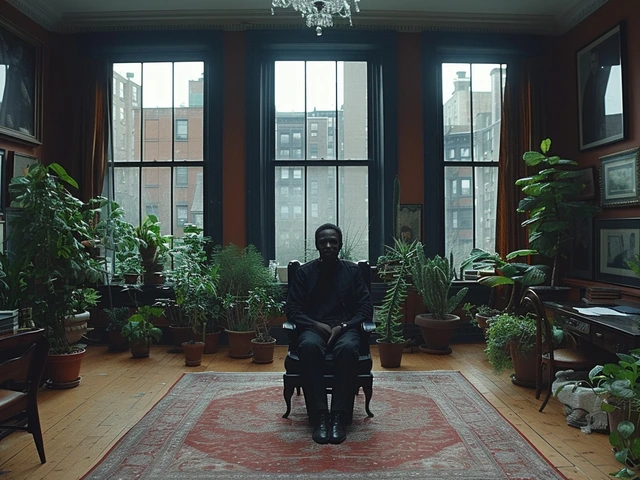The Magic of Reiki: Transforming Lives Naturally
Unlocking the Essence of Reiki
When pondering about life's mysteries, energy and healing, Reiki often springs to mind. Originating from Japan, Reiki, which translates to 'Universal Life Force Energy', has been touching lives and bringing about transformation naturally and holistically. The beauty of Reiki lies in its grace and simplicity. While it may sound mysterious and complex, Reiki is all about tapping into life’s vital energy to bring about health, happiness, and harmony.
The practice of Reiki is enshrined in the belief that our bodies have the innate ability to heal themselves. It’s all about directing the force of energy in our bodies to kick-start the healing process, create equilibrium, and foster wellbeing. So, if you’re tired of relying on pills and procedures for every ailment, Reiki could be the natural alternative you’ve been searching for.
Lessons from the East: The Birth and Journey of Reiki
Reiki as we know it today, started its journey in the 20th century but draws its wisdom from ancient Eastern philosophies. It was a man named Mikao Usui who, after weeks of dedicated meditation on Mount Kurama in Japan, came away with the keys to this powerful healing technique which he then started teaching to others. His practices traveled across the globe and have transformed millions of lives ever since.
Despite being over a century old, the essence and principles of Reiki continue to hold true to their roots. The practice still centers around the understanding that an unseen life force energy flows through us, and it’s this energy that defines our state of health and happiness. If one’s life force energy is deep and free-flowing, they are equipped to be healthy and content. When this energy is obstructed or diminished, it can lead to illness, stress, and unhappiness.
Decoding Reiki's Energy Transfer
The process of Reiki involves the Reiki practitioner placing their hands either directly on or above the recipient to channel the healing energy. The energy flows from the practitioner’s hands into the recipient’s body, tapping into the chakras, or energy centers, therein. The principle here is that of 'laying on of hands' or touch, to influence the patient's energy field and accelerate the healing process.
Assuming you're a bit skeptical, and I wouldn’t blame you for that. After all, how can someone’s hands hovering over your body possibly help alleviate a medical issue or condition? Well, it is important to remember that it is not the practitioner’s energy being transferred, but the universal life force energy. This may be hard to fathom for some, as it strays from our traditional understanding of health and healing. But then again, every breakthrough concept was once met with skepticism and disbelief, wasn't it?
The Many Benefits of Reiki
Proponents of Reiki boast a plethora of benefits it brings to the table. Apart from physical healing, Reiki serves as an excellent tool for de-stressing and achieving emotional balance. It has been found to effectively relieve pain, anxiety, fatigue, and depression, and to improve sleep and the overall quality of life.
Growing scientific evidence shed light on the effectiveness of this practice. For instance, a 2008 study by Dr. Barbara Brewer, reported significant improvements in pain and anxiety levels in the post-operative stage through the involvement of Reiki as part of post-operative care. Reiki is all about giving our bodies the gentle nudge they need to kick-start their own healing processes.
Can Anyone Learn Reiki?
One of the attractive elements of Reiki is that it isn't biased; anyone can learn it. Kids, adults, older people - anyone can receive the training and start their journey with Reiki.
A crucial part of Reiki training is receiving what’s referred to as 'Attunement' from a master practitioner. An attunement is like unlocking the door to your innate ability to channel the Reiki energy. It’s like tuning a radio to the correct frequency to receive a radio station - the station is always there, but the radio needs to be tuned in correctly to receive it. Hence, the term 'attunement'.
Reiki And Its Role in Complementary And Integrative Medicine
Reiki should not be considered as a replacement for traditional medicine. Often, it’s best used in conjunction with regular conventional medicine.
This type of healing technique has been recognized by modern medicine, and nowadays, it’s integrated into the patient treatment in many hospitals worldwide. It offers a non-intrusive, no-side-effect technique to supercharge the healing process, harmonize the emotions, and promote general well-being. And it’s not just for humans either; Reiki can also be used to promote the healing of pets and other animals too!
A Personal Tryst With Reiki
Now, you see, around six years back, on the insistence of a dear friend, I was introduced to Reiki. It came at a time when I was juggling with numerous pressures of life and health, and quite frankly, I was skeptical. It didn't sound scientifically solid to me. But, being at the edge of desperation, I gave it a go, for the lack of a better option.
And, believe me or not, it transformed my life in ways I could never have envisaged. The first few sessions left me feeling deeply relaxed and serene, bringing about a peace I hadn’t felt in a long while. With time, the frequency of my recurrent migraines reduced, my energy levels improved, and I felt more equipped to deal with the challenges of every day. It was as if I had discovered a new lease on life.
Demystifying the Spiritual Connection of Reiki
Reiki is often misunderstood to be a religious practice, but it couldn't be further from the truth. It doesn’t require any specific belief system or religious alignment. Though the practice is spiritual in nature, it is not a religion. It complements any faith or belief system. You can be a believer, an atheist, an agnostic or align with any religion in the world, and Reiki will still work for you.
All Reiki requires is an open mind and a will to accept the healing energy. The energy work transcends all dogmas and norms and instantiates the term 'universal,' without any prejudices.
The Fascinating World Beyond Reiki: Other Energy Healing Techniques
While Reiki holds a paramount space, it's definitely not the lone wolf. There are many other energy healing techniques, like Healing Touch, Qi Gong, Pranic Healing, etc., that tap into the same principle of harnessing the life force energy to bring about wellness.
However, each brings its unique touch, techniques, and practices to the table. Even though Reiki might be the most well-known, exploring these other practices can also offer new insights and pathways to healing and overall wellness.
Conclusion: Reiki - A Journey Towards Natural Well-Being
So, as I wrap up this deep dive into Reiki, I hope you emerge with an understanding that it offers a non-invasive, natural path to wellness. It's not just about healing diseases or relieving symptoms; it's about attaining a balanced state of health and well-being, in harmony with our natural existence.
Whether you choose to embark on this journey of learning Reiki or choose to receive Reiki from a trained practitioner, be sure to keep an open mind. After all, it's only with openness that the universal life energy can find its way to you and offer its healing. I am Dante and I can say, from personal experience, embracing the magic of Reiki may well be one of the best decisions you will make for yourself.







Comments